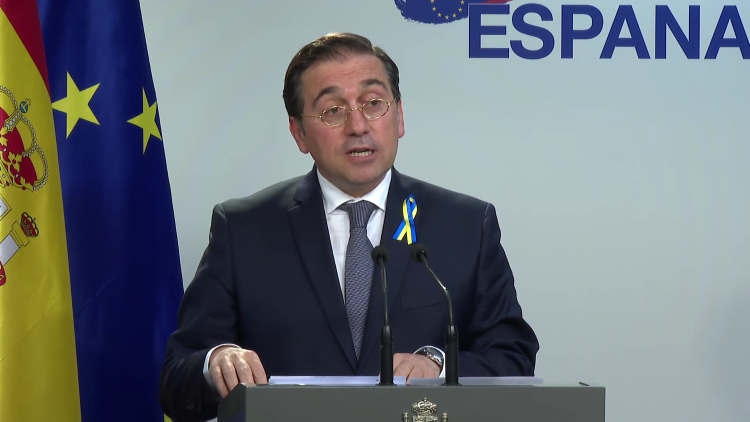Eduardo González
The Minister of Foreign Affairs, José Manuel Albares, will debate today with his counterparts from the 27 EU States on the situation in Ukraine and the conflict in the Middle East, including the peace conference proposed by Spain to reactivate the two-State solution and “the risks of regional escalation, including in the Red Sea.”
As reported by the EU, the meeting of the Foreign Affairs Council (FAC) will begin with an informal exchange of views with the Minister of Foreign Affairs of Ukraine, Dmytro Kuleba, by videoconference and will continue with a ministerial debate that will focus, above all, on EU security commitments and military support to Ukraine. In addition, other issues will likely be addressed, such as accountability, frozen Russian assets, restrictive measures and Ukrainian President Volodymyr Zelensky’s Peace Formula.
The other major topic of the FAC this Monday will be the situation in the Middle East, after the meetings of the European Council and the Foreign Affairs Council in December, in which this conflict was addressed. The heads of diplomacy of the 27 will hold informal exchanges with the Ministers of Foreign Affairs of Israel, Israel Katz; the Palestinian Authority, Riyad al-Maliki: Saudi Arabia, Faisal bin Farhan Al Saud; Jordan, Ayman Safadi; and Egypt, Sameh Shoukry, and with the secretary general of the Arab League, Ahmed Aboul Gheit.
Next, the ministers of the 27 will discuss the humanitarian situation in the Gaza Strip and the need for unhindered humanitarian assistance, the release of hostages by Hamas, the full implementation of UN resolutions and the situation in the West Bank They will also reflect on the “day after” the conflict, including a possible peace plan, the holding of a peace conference (proposed by Spain a few months ago and accepted by the European Council) and the need to take concrete measures to reactivate the solution of two states, “including through continued support for the Palestinian Authority.”
The FAC will also address the risks of regional escalation, “including in the Red Sea.” Precisely, Albares himself reported this past Friday, during an informative breakfast at the New Economy Forum in Madrid, that during today’s meeting in Brussels the ministers of the 27 will debate the implementation of “a purely European mission that will be in the Red Sea, if we unanimously decide,” and assured that “Spain is not going to oppose the emergence of a European operation.”
In this regard, the High Representative of the European Union for Foreign Affairs and Security Policy and Vice President of the European Commission, Josep Borrell, assured on Friday in Valladolid that the EU will not send its ships to participate in active combat missions to the Red Sea. , but only to protect navigation “a vital artery.” “We are preparing a naval mission with the sole objective of protecting navigation and not escalating the conflict,” he added.
Spain has refused to send ships and troops to Operation Prosperity Guardian, led by the US to protect shipping in the Red Sea against attacks by Houthi rebels. The Government of Pedro Sánchez has requested the creation of a specific mission with “its own scope, means and objectives” and has rejected the European Union’s claim to link this operation to Atalanta, the mission led by Spain to combat piracy in the Indian Ocean.
Last Monday, Sánchez himself specified that he is willing to “study” the US proposal for Spain to participate with liaison officers in the Red Sea mission and reiterated that his Government is not opposed to the creation of any operation in the Sea. Red as long as it is not part of Atalanta, which “does not have the characteristics nor is it of the nature of the operation required for the Red Sea.”







